Puberty and Special Needs
The word ‘puberty’ strikes fear in most parents as their children go through this confusing and uncomfortable stage in life, but parents of children with special needs face other complexities in ensuring a smooth transition through this period.
“The stages they go through are essentially similar, but special needs children go through puberty differently. The difference between a typically developed child and a special needs child is the approach in which you teach them to understand the changes they are going through,” said Ellie Han Yung Lin, a clinical psychologist who recently spoke on the topic at a webinar hosted by Taarana.
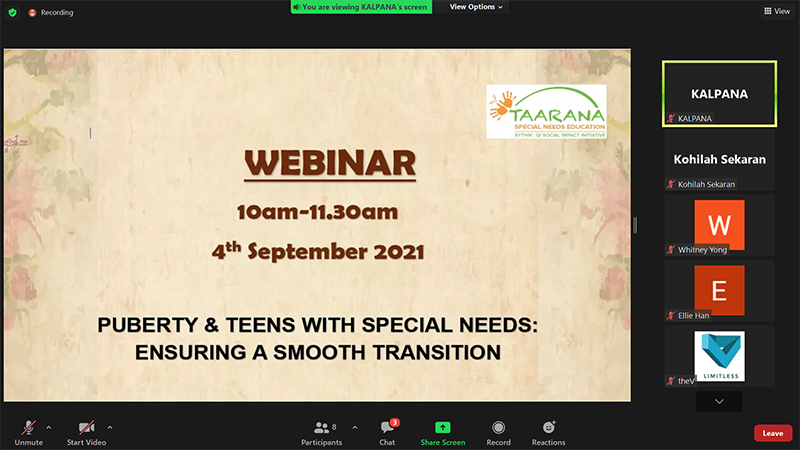
The Taarana centre was established by RYTHM Foundation in 2011 to create an inclusive educational environment for children with special needs. They also aim to provide resources and support to enable equal access to quality education for children of all abilities. Despite being in the middle of a pandemic, the team at Taarana has continued to provide education and support for students with special needs.
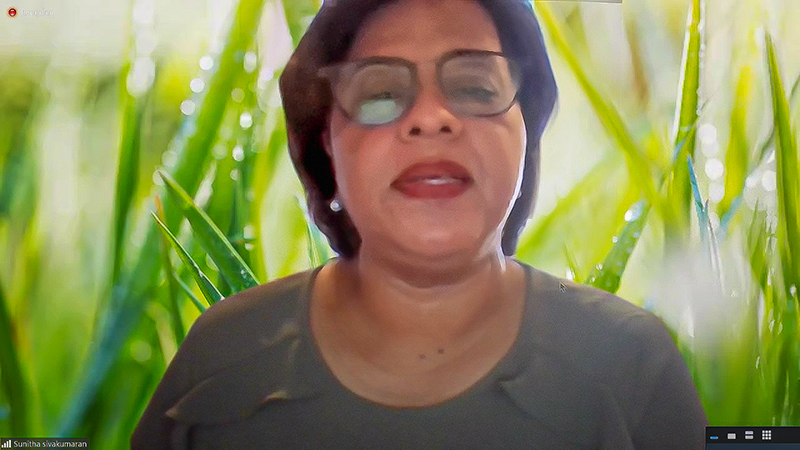
Also Read: Diagnoses to Make a Difference to Special Needs Children
Their efforts include hosting webinars to raise awareness on topics relevant to the lives and education of children with learning disabilities and other special needs. The recent webinar highlighted the topic “Puberty & Teens with Special Needs: Ensuring a Smooth Transition” and took place on Saturday, 4th September 2021 at 10 am. It was attended by parents and teachers of special needs students.
Dr Sunitha Sivakumaran, the principal of the Taarana centre shared, “Puberty is a time of great change for both the child and parents. As a mother of a special child myself, I found those years to be very trying. My son’s mood changes, and energy level variations were difficult as he was not able to express his feelings and the changes he was experiencing, which led to many outbursts and left me feeling helpless and frustrated.”
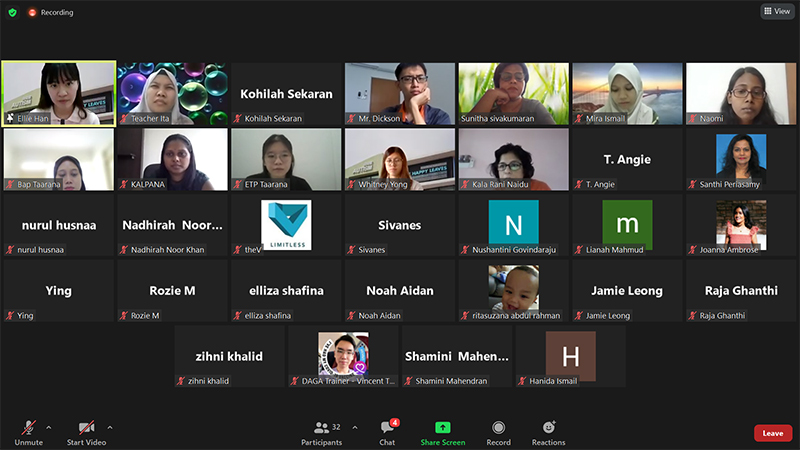
Looking back on her own experience, Dr Sunitha was reminded of the necessity to prepare parents to support their children through the pubescent changes. She highlighted, “As parents, we need to support our children whilst they undergo this transition, and it can be very trying as the child will not only face physical changes but also emotional and psychological changes too. As such, it is important that we parents are equipped with information to handle the changes.”
Invited to speak to the parents on this topic of understanding the transition through puberty was clinical psychologist Ellie Han Yung Lin, from Happy Leaves, an autism and special needs therapy centre. Ellie has an in-depth knowledge of working with children with learning disabilities and is currently pursuing her PhD at Universiti Kebangsaan Malaysia (UKM). She spoke to parents about understanding the transition through puberty for children with special needs.
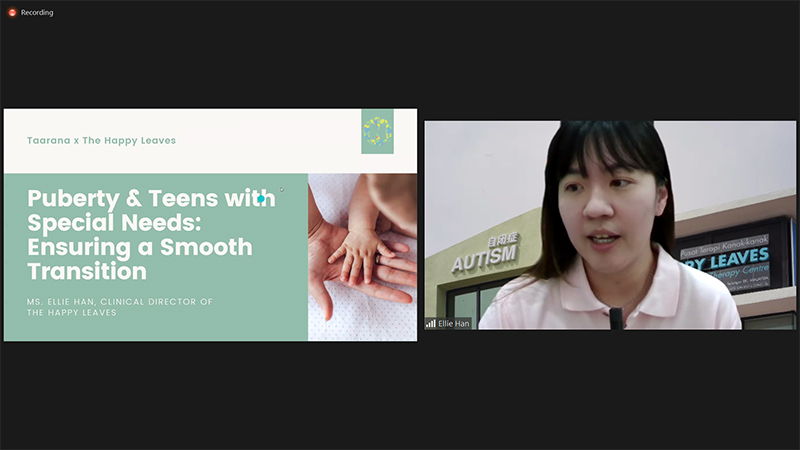
“First of all, we need to understand the transition because it’s something very new to them; they know nothing about it. They may suddenly wake up feeling different about their bodies and not know how to respond because they don’t know what to expect. So, we have to give them the knowledge first,” said Ellie.
Also Read: Down Syndrome Day Celebration at Taarana
According to Ellie, puberty occurs at a universal average age of 12 for girls and 14 for boys, and it takes about three to four years for the phase to pass before the teens become settled in themselves. The transition can involve a range of changes to the body, including bone elongations, pubic hair growth, breasts (for girls), acne, weight gain, changes in shape such as expanding shoulders or widening of hips, changing voices and more. Beyond physical differences, teenagers also go through emotional and psychological changes as they navigate their understanding of their identities.
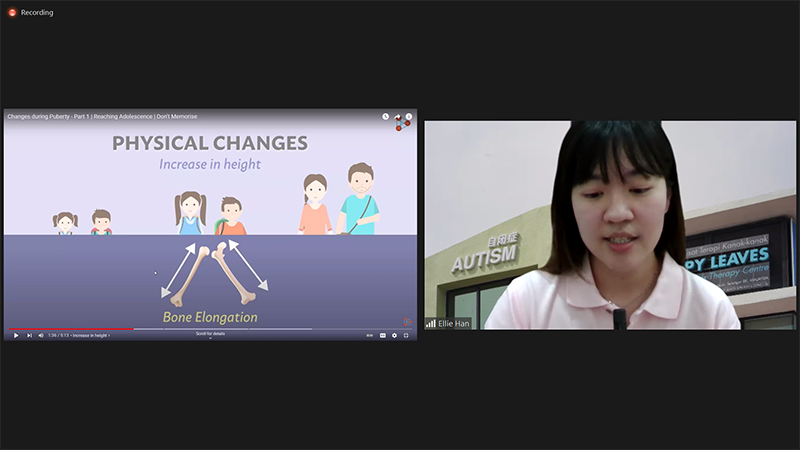
Ellie highlighted just how crucial clear and open communication is with a special needs teenager during this period. Apart from questions to spark conversations, parents are encouraged to use scientific terms for body parts to normalise them while also using videos, diagrams or any other visual material that can support their child’s understanding of their transition. Parents are also encouraged to involve their children as much as possible in making decisions for themselves and their bodies to create some independence.
“Normalise what they are going through and make them feel like it is okay for them to go through what they are experiencing. These are things that you have to tell them; there’s no awkwardness here. The more they know about it, the more they can avoid feeling anxious or exploring to get answers,”said Ellie.
Apart from increasing the child’s awareness of the physical changes, it is crucial to include education of emotions. According to Ellie, teaching children about moods can be tricky and needs to be incidental learning. “Emotions have to be taught in the moment; you have to catch the emotions they might feel and point it out to them. Use observation indicators to identify their emotions or help them identify others’ emotions.”
In answer to a question from the audience regarding handling puberty in low-functioning children on the autism spectrum, Ellie explains that it is difficult to teach them concepts. Therefore, identifying emotions, freedom of expression, and awareness is probably out of the question. Parents should focus on teaching the child about the physical aspect, such as helping them familiarise themselves with their bodies and tailoring their learning based on their environment and needs. Ellie also highlighted the various approaches to handling aggression, sex education, personal hygiene and the importance of personal space.
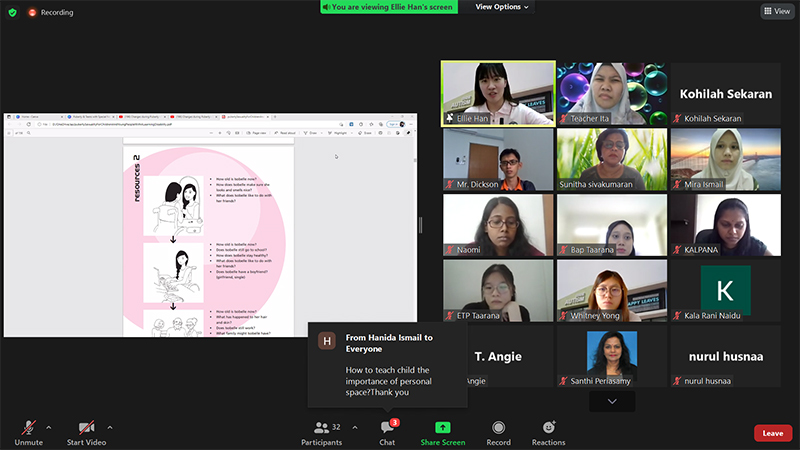
Also Read: World Autism Day Celebration at Taarana
Ellie also answered another question from a teacher in the audience about helping parents to recognise that their special needs children are growing up. She emphasised that no matter the child’s age, it is important to look at the parents’ goals for their children and build an awareness amongst the parents about the opportunities to create independence for their special needs children.
“Even though they have special needs, they are still growing in age. We are fighting against time. One day, they will be grown up. One day, parents will grow older and worry about their children. Therefore, we want to create as much independence as possible. You have to catch the teaching moments,” said Ellie.
Puberty is a confusing time for all children, whether or not they have a disability or special need and it’s really about figuring out which approaches work for the individual child. While no one size fits all, having parents and teachers equipped with knowledge and information to guide a child through the transition is always an advantage.
“As teachers and parents, we need to remember that this is a phase we have to go through together with the child. There will be hardship and challenges, but you know that it is going to end. As they grow into their adolescence, their hormones will become more stable,” said Ellie.
“It is important as parents can help their child by equipping themselves with the right information, role modelling body acceptance and being reassuring. It is also important that parents respect their child’s privacy, whether the child is special or not,” said Dr Sunitha.
